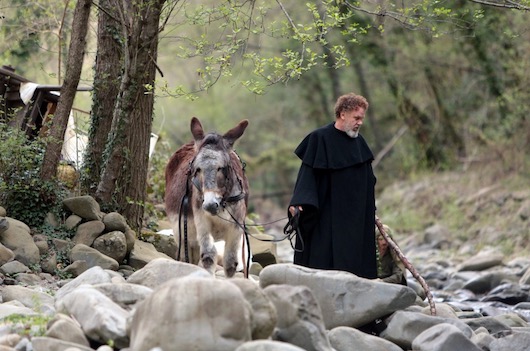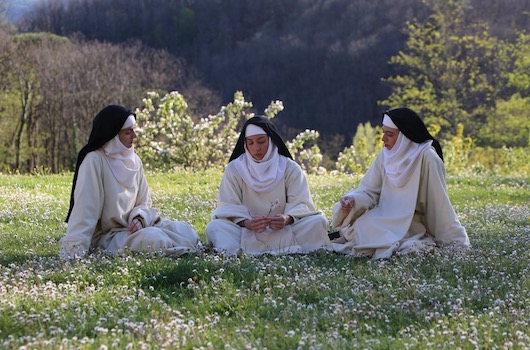
Perils of Adam
by ELEANOR MORROW
The Little Hours
dir. Jeff Baena
90 minutes
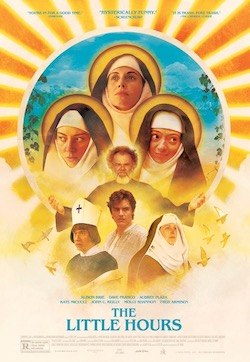 You can tell how much writer-director Jeff Baena loves his girlfriend Aubrey Plaza in the opening moments of The Little Hours. Fernanda is a young witch posing as a nun in 15th century, and as she drags a donkey across a landscape that looks suspiciously un-European, the camera can barely hold its attention off of her. Baena writes his life partner into the most objectionable role, but this is a subtle message also esteemed in the source material of The Decameron: the unlikeliest things are also the holiest.
You can tell how much writer-director Jeff Baena loves his girlfriend Aubrey Plaza in the opening moments of The Little Hours. Fernanda is a young witch posing as a nun in 15th century, and as she drags a donkey across a landscape that looks suspiciously un-European, the camera can barely hold its attention off of her. Baena writes his life partner into the most objectionable role, but this is a subtle message also esteemed in the source material of The Decameron: the unlikeliest things are also the holiest.
Plaza looks a lot like Alison Brie since for the most part all we see are their full-lipped, pouting faces and icy eyes. Even with her body obscured, there is something indecent about Alison, and no matter how prim she looks, we realize she will be disrobing at some point in every narrative. In The Little Hours, that comes in the garden of a convent, where she pounces on the mute gardener, Massetto (Dave Franco).
Even thought The Little Hours does not focus at all on the beauty of its female leads, it would be a hard thing to obscure it. Baena not only seems devoted to Brie and Plaza, but this is also the best Molly Shannon, also playing a nun, and John C. Reilly, as the local priest, have looked in years. Baena gives all of his actresses and actors a quiet dignity, except for one.
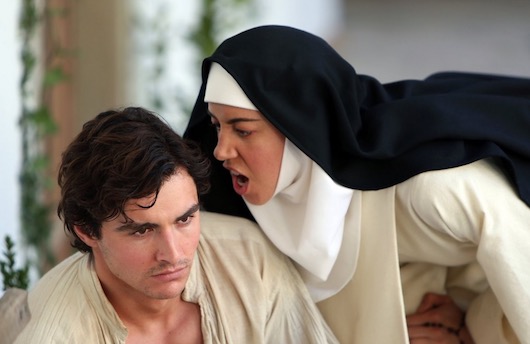
Dave Franco was maybe not the best actor to begin with, but he is supposed to be the straight man here and in this role he fails miserably. Attempting not to draw undue attention to Franco's physical form, Baena makes a show of his considerable deficiences. First of all, the man's gargantuan adam's apple slides up and down his throat perilously for the entire film. I don't know what everyone involved might have been able to do about this, but preventing Franco from repeatedly swallowing during his scenes would have been a welcome start.
The Little Hours initially focuses on Alison Brie's desire to leave the convent against the wishes of her father Ilario (Paul Reiser) in order to select a husband, but it is quickly distracted by her embroidery. Reiser never appears in the movie again and Brie never does manage to find a husband. Instead of any plot per se, we receive a series of jokes involving the aggressive nature of Ms. Plaza. Some are funny, like when she assaults the convent's handyman and calls him a Jew. Others are not really as enlivening, since they involve her brandishing a knife repeatedly and saying 'fuck' more times than is really entertaining.
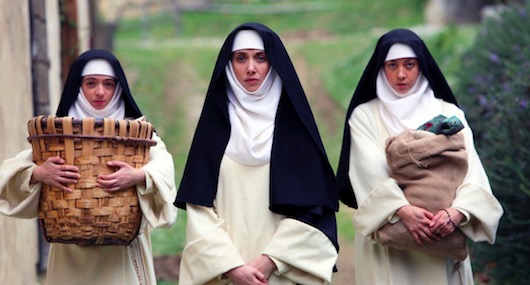
Baena's last directorial effort, Joshy, was a clone of The Big Chill that was very serious and depressing. In contrast, The Little Hours is even less significant or thematically memorable than a Mel Brooks movie. It is at least a great deal funnier, which is not actually saying a lot. It is obvious that the film was made on a considerably tiny budget, and it shows. The Little Hours avoids displaying the local town at all – we just see actors going and returning from the place. Even the props and costumes on this production are third or fourth rate.
Late in the film, Fred Armisen shows up as a bishop. His presence adds a striking focus to the proceedings, as if what we really required to enjoy the bad behavior of these purported adherents to the word of the lord was an antagonist who doubted their sincerity. It is a missed opportunity that he only receives a few scenes, and that they are the most amusing in the entire film reminds us that The Little Hours is about as meaningful as a Portlandia sketch.
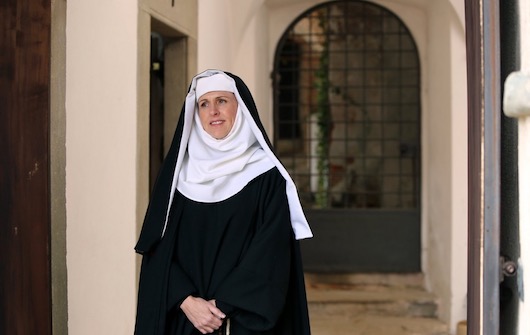
I don't know what turned Baena off from making serious cinema instead of something this frivolous. He might taken a page out of the comparative success of The Big Sick and made something that comes a little more directly from his heart. He could make a movie about why Aubrey Plaza is interested him. Does he have a large penis or cooking skills that would otherwise explain why she lives in the house?
Eleanor Morrow is the senior contributor to This Recording.
